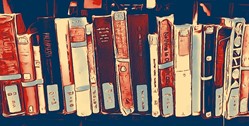Genealogists and Home Libraries
 I am in the 5%.
I am in the 5%.
Every week the New England Historic Genealogical Society sends around an electronic newsletter called The Weekly Genealogist. It always contains a survey, and last week’s question asked how many books are in personal genealogy libraries.
I answered that I have 251-1000 genealogy books, and only 5% of the respondents fell into that category. The largest group, 20%, had 26-50 books.
Luckily for me, I did not have to purchase all my books, although my husband/tech advisor still grumbles that he had to buy and install bookcases for them. I inherited most of what I have from my dad’s cousin.
I rarely use most of them, but I like having them around for when I need them. I do keep a few, well-thumbed references on my desk that I consult regularly:
- Black’s Law Dictionary. I received a copy of the 1891 first edition for Christmas one year, and it really helps for finding definitions of unfamiliar words in old legal documents.
- Evidence Explained by Elizabeth Shown Mills. I regularly turn to this reference when creating source citations.
- The Handybook for Genealogists, ninth edition. I won this as a door prize once, and it provides a quick reference for county information across the United States.
- Historical and Genealogical Atlas and Guide to Barnstable County, Massachusetts. This gem has great, detailed maps of the towns on Cape Cod.
- A Primer for The Master Genealogist by Terry Reigel. I still use the no-longer-available TMG for my genealogical database, and this wonderful handbook gives clear instructions for using all its intricacies.
- Rand McNally Road Atlas. My ancestors lived all over the United States, and I find it useful to consult the maps of their states.
- The Reeds of Ashmore by Michael Hayden. My distant cousin Michael put this together in 1988 as part of his doctoral dissertation. It traces our Reed lineage from colonial times. I use his book to determine how modern-day descendants fit into my family tree. In recent years, it has become helpful in determining my relationship to DNA matches.
- A Research Guide for Norwegian Genealogy, sixth edition by Carol A. Culbertson and Jerry Paulson, editors. This book is packed with information about Norway, Norwegians, and how to do Norwegian genealogy. It includes a useful glossary of Norwegian genealogical terms.
I like having print resources available. In seconds I can use these familiar tools to lay my hands on the information I need without having to take time to scour the internet for it.
Most of the people who responded to The Weekly Genealogist survey had fewer than 50 books. I would fall into that category, too, if it were not for the inheritance from Dad’s cousin.
Few of the newsletter readers have the large library I do. I am glad to have it during these months of the pandemic when I cannot visit libraries in person to find sources that have not been digitized.
I enjoyed taking this survey to see where I fall on the spectrum of researchers and their books.